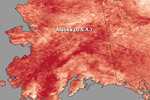Globally, this April was a scorcher, tying with 2010 for the warmest April on record, according to new data released by the National Oceanic and Atmospheric Administration (NOAA) last week. This makes 2014, to date, the sixth warmest year on record going back to 1880 when comparing the first four months. However, if an El Nino event strikes this summer or fall—as seems increasingly likely—global temperatures could rise even more.
April’s temperatures were 0.77 degrees Celsius (1.39 degrees Fahrenheit) above the 20th Century average around the world. Europe, Australia, the Middle East, and northern Africa all experienced temperatures well-above average. But the hottest region proved to be Eastern Siberia, where temperatures hit more than 5 degrees Celsius (9 degrees Fahrenheit) above the 20th Century average. Meanwhile, much of Canada, the U.S. Midwest, and portions of Central Asia were below average.
April 2014 is also a landmark for being the 350th month in a row where global temperatures have been above the 20th Century average: the last time the world had a below-average month was February 1985. Moreover the last time the world had a below average year was 1976. According to NOAA the warmest year on record was 2010.

Average April temperatures worldwide as compared to a 1981-2010 baseline. Map courtesy of NOAA.
Temperatures around the world are rising due to the ever-increasing greenhouse gas emissions most of which come from burning fossil fuels—coal, oil, and gas—for energy, but which are also released by deforestation and industrialized agriculture. While nations have pledged to keep global temperatures from rising more than 2 degrees Celsius (3.6 degrees Fahrenheit), experts say we are currently on track for much greater rises given a lack of political effort to tackle emissions.

Aprils from 1880 to today. Graph courtesy of NOAA.
Related articles
Extreme cold and drought in U.S. linked to climate change

(05/23/2014) The U.S. Midwest and Northeast experienced one of the coldest, snowiest winters on record this past season. This might seem contrary to warming trends forecast by climate scientists, but a new analysis released today in Science points out that climate change caused by greenhouse gas emissions may actually have contributed to the well-below average temperatures seen in parts of the U.S.
Earth has fourth warmest March on record as forecasters see possible El Nino rising
(04/23/2014) Last March was the fourth warmest on record, according to new data from the National Oceanic and Atmospheric Administration (NOAA). Overall, temperatures were 0.71 degrees Celsius (1.28 degrees Fahrenheit) above the 20th century average during March. Looking at the first three months of 2014, this year is the seventh warmest on record to date.
Despite frigid cold in U.S., January was the fourth warmest on record worldwide
(02/27/2014) Worldwide, this January was the fourth warmest since record-keeping began, according to new data released by National Oceanic and Atmospheric Administration (NOAA). While parts of the world, most notably eastern North America and northern Russia, experienced temperatures well-below average, overall the month was a scorcher. In fact, another dataset, from NASA’s Goddard Institute for Space Studies (GISS), that uses different methodology, found that January was the third warmest since record keeping began.
Alaska roasting: new NASA map shows the Final Frontier in grip of January heatwave

(02/05/2014) Alaska got California weather at the end of January, as displayed by a new map based on data by NASA’s Terra satellite’s Moderate Resolution Imaging Spectroradiometer (MODIS). The U.S. state experiences one of its warmest winter periods on record during the second half of January, including some temperatures that ran 40 degrees Fahrenheit (22 degrees Celsius) above average. According to the EPA, temperatures in Alaska have risen an average of 3.4 degrees Fahrenheit (1.9 degrees Celsius) in just the last 50 years due to climate change.
2013 was the seventh hottest year yet

(01/27/2014) Global warming continues apace as 2013 was the seventh warmest year in the past 133 years, according to a new analysis from NASA’s Goddard Institute for Space Studies (GISS). In total, the global temperature in 2013 averaged 14.6 degrees Celsius (58.3 degrees Fahrenheit), or 0.6 degrees Celsius (1.1 degrees Fahrenheit) hotter than the 20th Century average.
Underestimating global warming: gaps in Arctic temperature data lead scientists and public astray

(01/15/2014) No place on Earth is heating up faster than the Arctic, but just how fast has remained an open question due to large gaps in temperature data across the vast region. Now, a recent study in the Quarterly Journal of the Royal Meteorological Society finds that not only is the Arctic warming eight times faster than the rest of the planet, but failure to account for temperature gaps has led global datasets to underestimate the rise of temperatures worldwide.